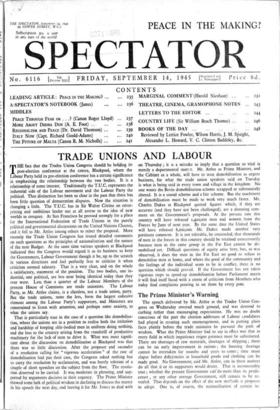TRADE UNIONS AND LABOUR
THE fact that the Trades Union Congress should be holding its post-election conference at the centre, Blackpool, where the Labour Party held its pre-election conference has a certain significance in emphasising the relationship between the two bodies. It is a relationship of some interest. Traditionally the T.U.C. represents the industrial side of the Labour movement and the Labour Party the political. That distinction has been so clear in the past that there has been little question of demarcation disputes. Now the situation is changing a little. The T.U.C. has in Sir Walter Citrine an enter- prising and ambitious leader not at all averse to the idea of new worlds to conquer. At San Francisco he pressed strongly for a place for the International Federation of Trade Unions in the purely political and governmental discussions on the United Nations Charter, and it fell to Mr. Attlee among others to reject the proposal. More recently the Trade Union Congress has issued detailed statements on such questions as the principles of nationalisation and the nature of the next Budget. At the same time various speakers at Blackpool indicated that the Congress would regard it as its business to keep the Government, Labour Government though it be, up to the scratch in various directions and feel perfectly free to criticise it when criticism seemed salutary. That is a very clear, and on the whole a satisfactory, statement of the position. The two bodies, one in- dustrial, one political, are less near being identical today than they ever were. Less than a quarter of the Labour Members of the present House of Commons are trade unionists. The Labour Party, as Mr. Attlee claims, is a classless, not a trade union, party. But the trade unions, none the less, form the largest cohesive element among the Labour Party's supporters, and Ministers are constrained to listen with attention, and perhaps some anxiety, to what the unions say.
That is particularly true in the case of a question like demobilisa- tion, where the unions are in a position to realise both the irritation and hardship of keeping able-bodied men in uniform doing nothing, and the loss to the country arising from the standstill of productive machinery for the lack of men to drive it. What was most signifi- cant about the discussion on demobilisation at Blackpool was that there was so little discussion. After the proposer and seconder of a resolution calling for "vigorous acceleration" of the rate of demobilisation had put their case, the Congress asked nothing but to carry the resolution by acclamation, and was barely tolerant of a couple of short speeches on the subject from the floor. The resolu- tion deserved to be carried. It was moderate in phrasing, and sup- ported by arguments decisive in their cogency. The Prime Minister showed some lack of political wisdom in declining to discuss the matter in his speech the next day, and leaving it for Mr. Isaacs to deal with on Thursday ; it is a mistake to imply that a question so vital is merely a departmental matt :r. Mr. Attlee as Prime Minister, and the Cabinet as a whole, will have to treat demobilisation as urgent business, for what the trade union speakers said on Tuesday is what is being said in every town and village in the kingdom. No one wants the Bevin demobilisation scheme scrapped or substantially altered. It is a sound scheme and a fair scheme. But the machinery of demobilisation must be made to work very much faster. Mr. Charles Dukes at Blackpool quoted figures which, if they are accurate (and they have not been challenged), are a damning com- ment on the Government's proposals. At the present rate this country will have released rAoo,000 men and women from the Forces by June of next year. By the same date the United States will have released 8,20o,000. Mr. Dukes made another very pertinent comment. It is not tolerable, he contended, that thousands of men in the forces in this country should be retained unnecessarily because men in the same group in the Far East cannot be de- mobilised yet. Difficult questions of equity arise here, but, as was observed, it does the men in the Far East no good to refuse to demobilise men at home, and where the good of the community and the feelings of the individual seem to be in conflict, there is no question which should prevail. If the Government has not taken vigorous steps to speed-up demobilisation before Parliament meets it will find itself faced with a storm of criticism from Members who today find complaints pouring in on them by every post.


























